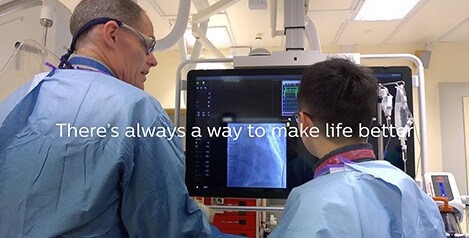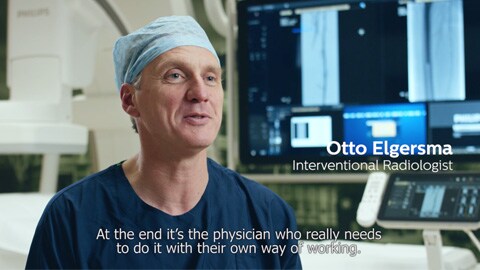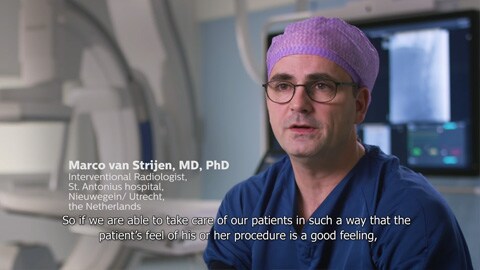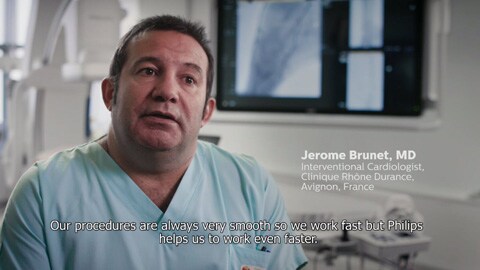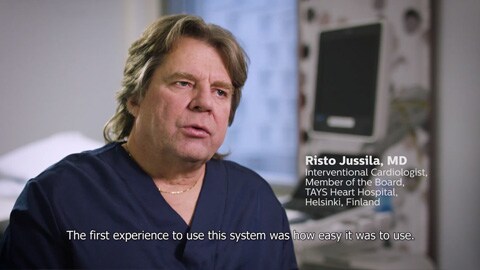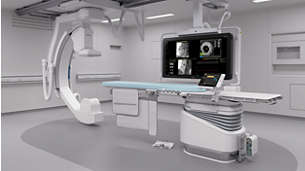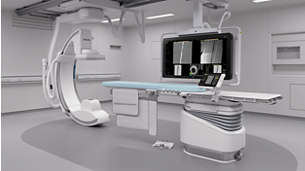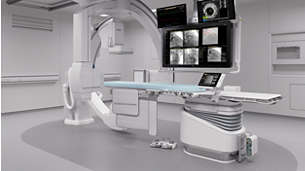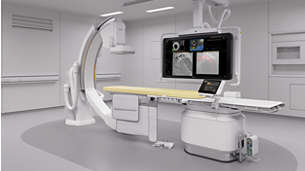As a tertiary referral center, the team at Nottingham University Hospitals Trust provides a cardiac service to around 2.5 million people from Nottinghamshire and surrounding counties, delivering approximately 1,200 PCIs every year. It is an incredibly busy department where most interventional procedures take place in just two interventional labs. The team faced the challenge of delivering a high throughput of complex cases at a low staff and patient dose. So, when the opportunity arose to trial the new-generation Azurion image-guided therapy platform, they jumped at the chance.
Making a real impact
“The main challenges faced by the cardiology department at Nottingham are essentially workload and the need to keep the waiting list down with stretched resources,” observes Andy Rogers, Head of Radiation Physics. “Azurion has addressed these challenges mainly through its ease-of-use, but there are also lots of scientific improvements that we can make.”In particular, he describes Azurion’s ability to integrate advanced interventional tools, including third-party equipment, into the operating system as “a massive leap forwards.”
Outstanding image quality, low radiation dose
One of the biggest attractions of Philips Azurion is the opportunity that the technology provides to manage radiation dose. Mr Rogers explains: “We’re hoping to manage doses to patients mainly because it has a bigger, more efficient detector and that means that we can use a low dose to start with. When we might have used more dose in the past to look at small regions and magnify the image, now because of the better image quality we might just be able to do an electronic zoom, as people would do on their cellphones. This means instead of magnifying the image in real terms, which has a dose penalty for the patients, we can just make it look bigger on the screen so they can see more detail.” Cardiologist Dr Will Smith can see these benefits in practice: “In a 90-minute case with 30 minutes’ screening time we only used half a gray of radiation to successfully treat a blocked right coronary artery. And that really means that effectively we do not have to worry about stopping a procedure because we have used too much radiation.” Dr Smith adds: “We have a big renal unit here and for patients with kidney disease, minimizing x-ray contrast is very important. The system allows the flexibility for a special protocol, so when I am working I will use fluoroscopy at a lower frame rate. I can make an acquisition at the full 15 frames per second, allowing us to achieve a high-quality before-and-after picture. The image quality is excellent and the really impressive thing is it manages to achieve that at a low dose.”
Ease-of-use meets exceptional efficiency
She notes that the new tableside touchscreen has been a revelation to staff members who are familiar with using touchscreen technology in their everyday communications. “It’s possible to access a variety of features that navigate the whole system via the tableside touchscreen,” she explained. “So for example, even where there is no radiographer, it could be manipulated by the medical staff which makes the system more user-friendly.” Ms Ivanova also believes that some dose-saving features could also make procedures more efficient. “CardiacSwing allows you to pre-program the angles of the actual investigation and as the system rotates it takes all the pictures with one injection of contrast,” she explained. “It reduces the procedure time, so definitely will have an impact on utilization of the lab. Not every procedure will be quick and straightforward but for diagnostic procedures, it will help to make a difference.”
As a nurse specialist for interventional cardiology, Julia Ivanova is responsible for developing clinical processes, new procedures and protocols. She has been impressed with the impact of a number of Azurion’s innovations. She explains: “For radiographers, Azurion makes a huge difference, as the new procedure cards allow customized and pre-programmed protocols for different procedures. The system intuitively picks up the protocol, providing consistency of performance and supporting less experienced members of staff without compromising on the outcome.”
Innovative training, outstanding support
The team at Nottingham are full of praise for Philips’ three-staged approach to Azurion training. Philips trains ‘SuperUsers’ who are responsible for cascade training to other colleagues. Due to the easy user interface, new users pick up the processes very quickly. As Mr Rogers comments: “The training approach in this new project has been both innovative and effective. Coming back after a few weeks, and then again after a few months to test how well that training has been embedded in people - I think is a really good approach.”
Mr Rogers is also delighted with the support he and his team have received throughout the Azurion project: “Because we were first-of-a-kind there was a lot that could have gone wrong, but the support we got from the global team and from Philips UK&I was exemplary. The project management and attention that we’ve had has proved invaluable.” In addition, being consulted by Philips, networking and collaborating with other teams and having the ability to contribute new ideas to the development of Azurion, is something that the team have found professionally rewarding. As Ms Ivanova concludes: “It has been an interesting project working with Philips, and we are proud to be one of the first centers to be experiencing the new technology.”
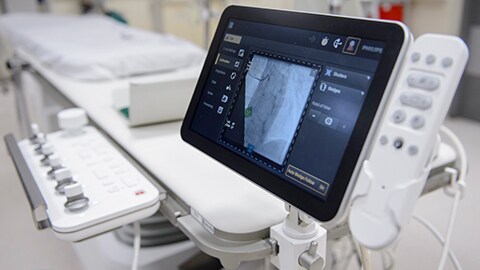
What your peers say about Azurion
Albert Schweitzer Hospital,
Dordrecht, the Netherlands Physicians, technologists, and managers from the Albert Schweitzer Hospital in Dordrecht, explain how the Azurion 7 M20 system saves them time, reduces X-ray dose usage and helps them improve their patient care.
St. Antonius Hospital,
Nieuwegein, the Netherlands Controlling everything from table side within the sterile field is one of the things valued by Interventional Radiology users at St. Antonius Hospital in Nieuwegein, The Netherlands.
Clinique Rhône Durance,
Avignon, France "Great team support" say clinical users in Interventional Cardiology at the Clinique Rhône Durance, Avignon, France.
TAYS Heart Hospital,
Helsinki, Finland With the opening of the TAYS Heart Hospital in Helsinki, Finland, a two week waiting time can be guaranteed from the referral. This is a big improvement compared to the general waiting times of three to nine months in specialized healthcare in Finland.
Related products
-
Azurion 7 M12
Experience outstanding interventional cardiac and vascular performance on the Azurion 7 Series with 12'' flat detector. This industry leading image-guided therapy solution supports you in delivering outstanding patient care and increasing your operational efficiency by uniting clinical excellence with workflow innovation. Seamlessly control all relevant applications from a single touch screen at table side, to help make fast, informed decisions in the sterile field.
NCVD003 -
Azurion 7 M20
Experience outstanding interventional cardiac and vascular performance on the Azurion 7 Series with 20'' flat detector. This industry leading image-guided therapy solution supports you in delivering outstanding patient care and increasing your operational efficiency by uniting clinical excellence with workflow innovation. Seamlessly control all relevant applications from a single touch screen at table side, to help make fast, informed decisions in the sterile field.
NCVD005 -
Azurion 7 B12/12
Discover amazing new possibilities for interventional cardiology, pediatric cardiology or electrophysiology with the Azurion 7 Series biplane with two 12'' detectors. This industry leading Image Guided Therapy System allows you to easily and confidently perform procedures with a consistent user experience, helping you optimize your lab performance and provide superior care. Seamlessly control all relevant applications from a single touch screen at table side, to help make fast, informed decisions in the sterile field.
NCVD010 -
Azurion 3 M12
Elevate your interventional cardiology capabilities with the Azurion 3 with 12'' flat detector. This high performance Image Guided Therapy System allows interventional teams to perform routine and challenging cardiac interventions. Seamlessly control all relevant applications from a single touch screen module at table side for a consistent user experience, and excellent lab performance and patient care.
NCVD001
